Toshio Okada Seminar #219 (2018.02)
Nerds' True Feelings Fully Open! Disney Animation "The Hunchback of Notre Dame". Alchemy, the thrill of secrecy. Today's science is wrong!
Secrets of Notre Dame - Urgent disclosure before all is lost in the fire accident at the World Heritage Site of Notre Dame de Paris.
Why is alchemy written so confusingly?
The book "Secrets of the Cathedral" by Fulcanelli should be written in a more straightforward way.
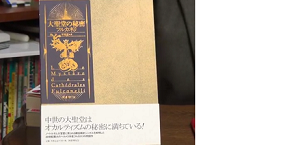
The book says with a consequential air using the words such as "a symbol of xxx" or "a symbol of xxxx", which is called Hermesism.
Why did he write it not straightforwardly?
・・・
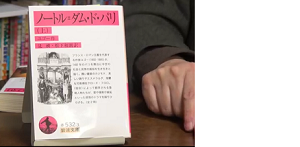
The story of "Notre-Dame de Paris" takes place around 350 years ago, around 1830, when Victor Hugo was alive.
So the year is 1482.
This was a time when the Renaissance was just beginning to hit France.
The Renaissance started in about the 14th century and moved northward through Europe from the 15th to the 16th century.
It started in Italy and went northward.
It was the end of the secretive "Gothic" era.
Gothicism really flourished around the 11th to 13th century. But it was wiped out by the Renaissance.
That's the Gothic.
So mysticism ended and rationalism began.
That's the Renaissance.
Fulcanelli called it "cheap Italian rationalism". He said, "The Renaissance is the philosophy of idiots who only see the surface of things" (laughs). They only see the surface of things.
That's how he saw "rationalism".
At a time when rationalism was infiltrated by the Renaissance and the French Revolution brought the world into the so-called light of the scientific age, an organization was born in England.
It was called "Freemasonry".
Freemasons were originally, in the earliest surviving records, medieval stonemasons around the fourteenth century.
People who quarried and carved stone.
That means the people who built this Notre Dame.
It was a group of people like this.
But in that mason's union, around the 17th century, much later, there was a movement to bring in aristocrats and gentlemen and intellectuals, not necessarily architecture or masons.
With the renaissance around the 14th century, there was a great decrease in the use of stone architecture, and it was replaced by brick.
This is how the organization was transformed.
That's when Freemasonry switched from an artisanal organization to a fraternal organization, or a normal organization.
So the point of this time is the new Freemasonry.
I call it "Second Generation Freemasonry".
Second generation Freemasonry leads to the current Freemasonry.
So, no matter how much research you do on today's Freemasonry, you can't find out anything at all about the alchemical Freemasonry that carved stone in the Middle Ages.
What kind of organization was the "first Freemasonry" in earlier times?
These first Freemasons created Notre Dame.
They created church buildings all over Europe and hid their knowledge of alchemy in them.
They, the first Freemasons, knew what Fulcanelli called "hidden meanings" and the secrets of alchemy.
Because they carve, so they know. They carved their own secret knowledge mixed in with Christian designs and stories, they had to know about it.
So, the first Freemasons believed in "alchemy" not a Christian god.
But the second generation of Freemasons didn't inherit that knowledge. The rituals of today's Freemasons are all secret. But it's a secret for nothing.
I just read in a comment that someone called them as "neo-Freemasonry," which I thought was a good name (laughs).
Today's Freemasonry is actually quite a philanthropic organization.
For example, let's take a look at this one.
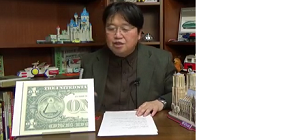
Here is the the back of a dollar bill, which some say, "This proves that Freemasonry controls the world!".
This is the "Eye of Providence". Again some say, "This Eye of Providence means, "We're watching you! "I'm controlling you!".
But in reality, this is "rationalism". It's a symbol of rationalism. And it's also a symbol of education.
And above this, it says, "God supports our schemes" in Latin.

At the bottom, you see "The New Order of the Times".

So, as you can see, this pyramid is under construction.
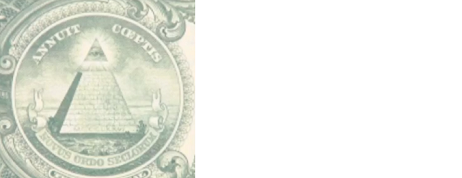
The pyramid under construction is actually quite rationalistic, in the sense that God supports the building of the United States as a country.
That's why this eye of Providence is also depicted in the prints of the French Declaration of Human Rights.
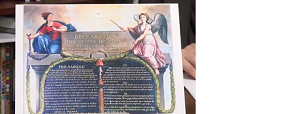
As you can see from this, though, today's Freemasonry is pretty much a symbol of reason. Because they use this as one of their symbols.
The actual symbol is a mason's compass or something like that though.
The reason they use the eye of Providence as one of the symbols is because of something like "education for all". Shining the light of reason and rationality on this whole world, and eliminating strange "spells" and other irrational things.
Freemasonry is a rather open-minded organization in that sense. There is no need to be secretive at all.
The reason why they're still secretive today is because the original masons of Freemasonry were secretive, so they've sort of inherited that tradition. Even though the members have already changed.
Lawyers, doctors, aristocrats, politicians, and so on, have joined Freemasonry, so there is no need for secrecy at all anymore. And yet, the secrecy part is inherited from the first generation.
I can't help but feel that there is something distorted, like neo-Atlantean.
"Today's Freemasonry is distorted," it could make some mad (laughs).
But I can't help but feel that way.
Second generation Freemasonry is characterized by openness, more of a rationalism.
So why was the first generation of Freemasonry so secretive? Because they had advanced technology and knowledge of alchemy as a professional necessity, so they became secretive.
The modern interpretation is that if the secret is exposed, the alchemical technology will not be monopolized or replicated. That's the way it's thought, so many books say so.
But I think it's actually not true.
・・・
This scientist(*1), a descendant of Gothic alchemy, believes that those who have knowledge are responsible for whether or not they give it to the world.
*1) He's mentioning Dr. Serizawa from 1st Godzilla movie here.
Scientists today are patent-oriented and publication-oriented, so their way of thinking is completely different.
In a good way, "You should not hide it, you should announce it as soon as possible. Let's leave it up to humanity to use that knowledge for good or bad".
"Born good by nature" theory. This is an unrealistic and pretentious matter.
But it is also true that humanity's sense of honor is what makes science grow. Such as "I want to be the first to publish my invention and take credit for it," "I want to get patent money for it," "I want to get credit for it".
Alchemists and Hermeticists are responsible scientists.
The scientific knowledge they have can be used as a weapon of destruction, depending on how it is used.
As alchemist can see from the experiments, mercury is very harmful to the body.
So it's easy to kill a human being, for example, by spraying something like mercury.
There are plenty of results of alchemist studies that show this.
But for hundreds of years, they didn't publish it.
So, actually, we only see "the goal" how sciences should be about alchemy as such a responsible science and logic as a science without responsibility, or science as we know it in general.
As a result, as a goal, responsible science has gone to extinction.
Ethical science has been extinct, and we are now at the point where we are willing to publish research. And how that research will be used is discussed and considered on a case-by-case basis.
We only know of a system where everything is open.
But in Victor Hugo's time, the French Revolution shed light on religion and made it possible to explain everything in a rational way.
This was a time when even inside Notre Dame, the altar was destroyed to honor the God of Reason. Hugo saw it and appreciated it, but at the same time he was troubled by the loss of Gothic architecture.
What is that mysticism, that alchemy then? He also keep in mind the worries of the previous era that only those with the necessary responsibilities should have the knowledge.
From a hermesian point of view, modern science is "cheap Italian rationalism", which is the conclusion of the fools who only see the surface of things called the Renaissance (laughs).
The conservativeness in alchemy because of the sense of responsibility.
It's interesting that there are very few records of what the Gothic carpenters carved.
<Original JP site:http://blog.livedoor.jp/okada_toshio/archives/51545717.html>
